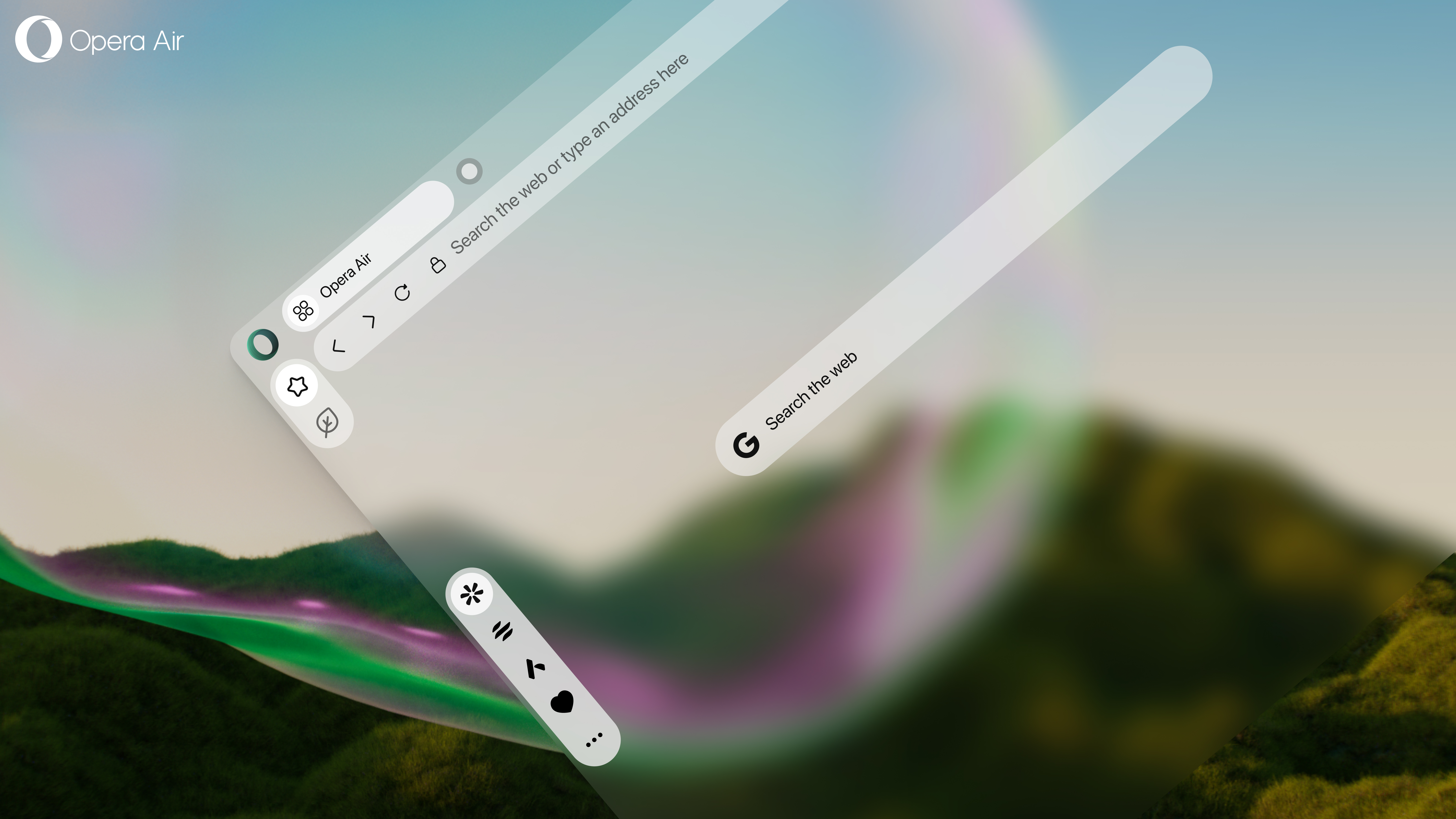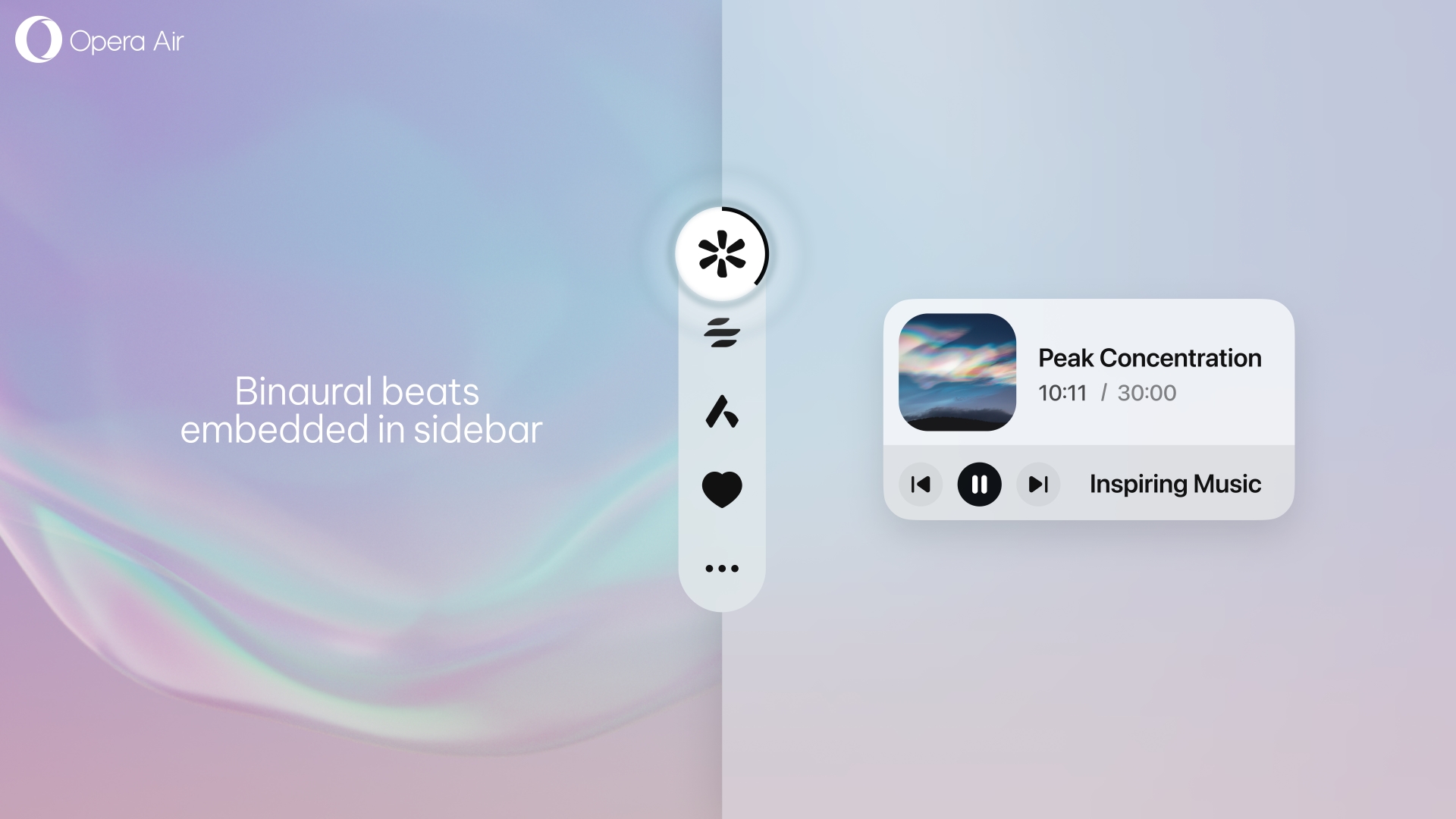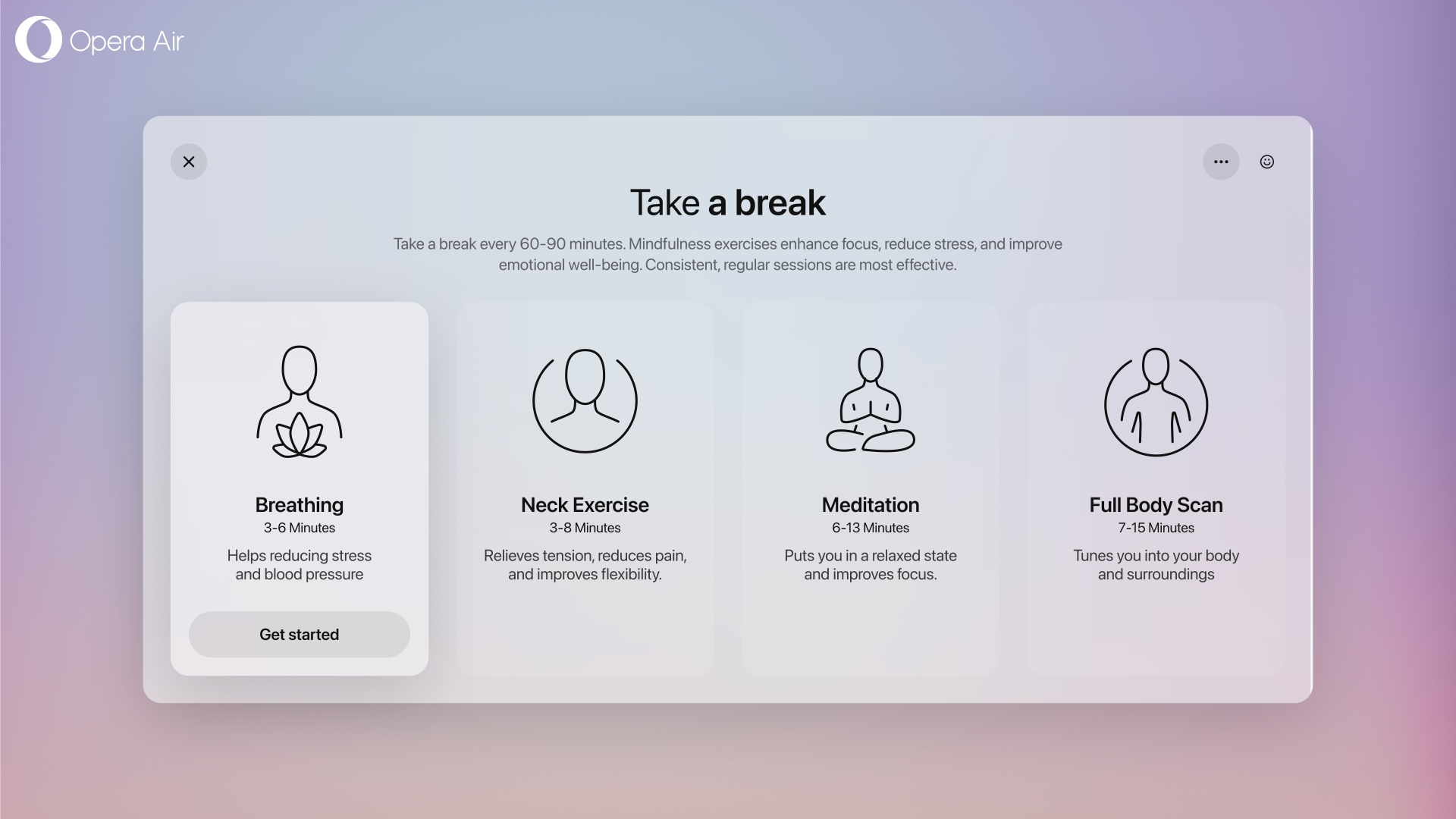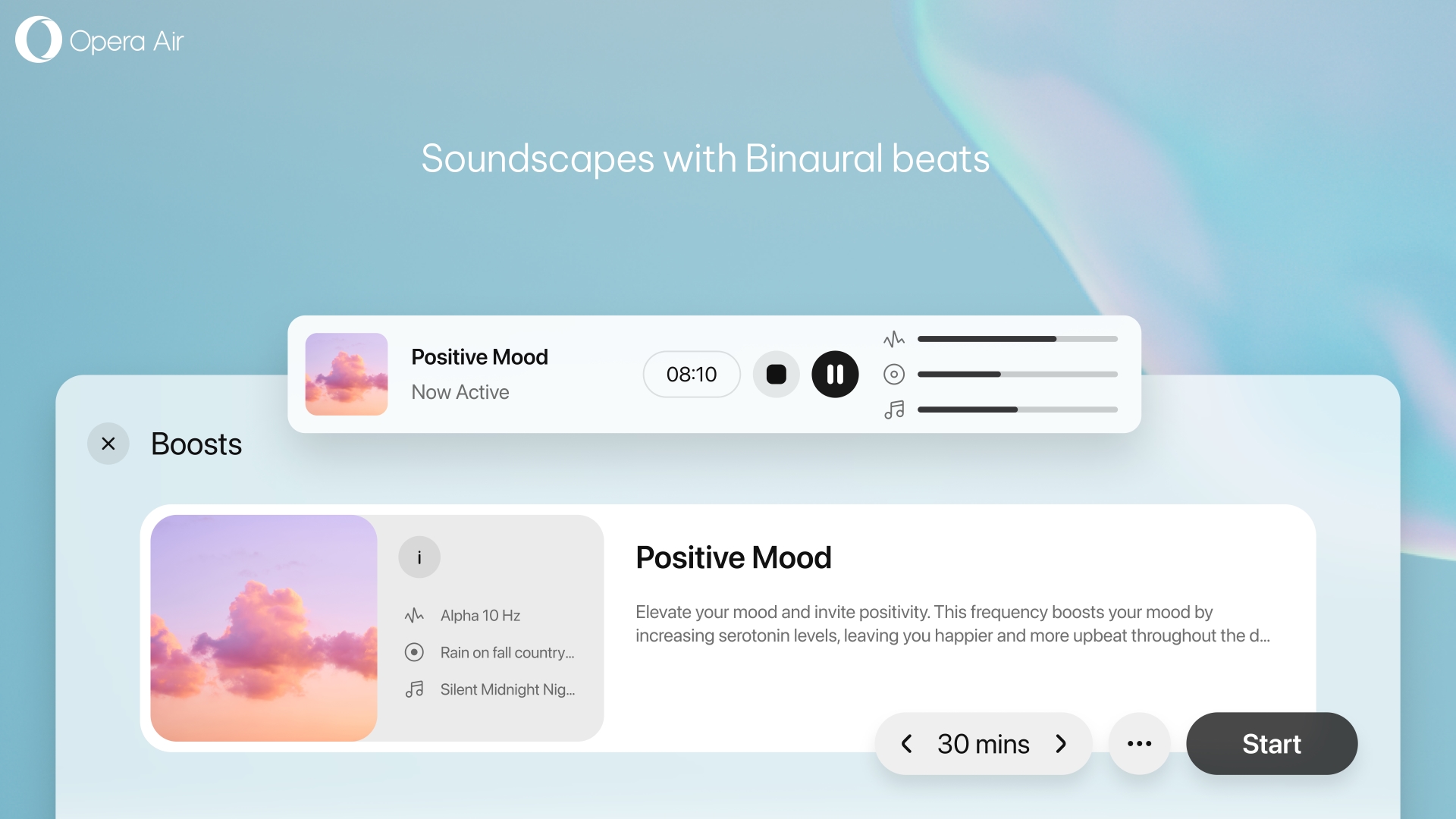Opera's Air browser wants to be the antidote to doomscrolling — but does it actually work?
Is this the most relaxing web browser ever? I took Opera Air for a spin to find out.

"Need more zen in your life?" isn't a question often asked of you while checking your mail in the morning, but that's exactly how Opera's new Air browser was pitched to me by my PR pal, Steve Green.
"Some say it's the most relaxing browser ever," Oh, they do, do they?
The internet is a noisy, chaotic mess of a place. Every click you make is a Russian Roulette gamble between productivity, entertainment, and falling into doomscrolling or a mindless rabbit hole, as you scamper to retrieve useless knowledge about 18th-century ghost ships when you know damn well you should be sleeping.
Luckily for us, Opera is here to stage an intervention against modern browsing, delivering unto us Opera Air, which is self-billed as "the world's first browser with mindfulness at its core." It won't promise faster page loads, improved buffering, or any major expansions on the privacy or safety features of the company's other browsers, but it does aim to bring you something you're not able to transmit over WiFi; focus, balance, and a stress-free mindset.
Those are admirable claims, and bold ones too. But can a browser really have such an impact on our daily lives? I downloaded Opera Air myself to see.
Opera Air: Hands-on with Opera's latest web browser
Opera Air's biggest selling point isn't some new-fangled rendering engine or a unique tabbed grouping feature. Instead, it's mostly vibes. Vibes, boosts, and breaks.
The first comes across in its minimalist, Scandinavian-like look, aiming to declutter the browsing experience and give things a more light and airy feel.
Stay in the know with Laptop Mag
Get our in-depth reviews, helpful tips, great deals, and the biggest news stories delivered to your inbox.
And it does look rather calming, there's not a squared edge in sight, as if the entire browser has undergone several layers of baby-proofing. Even the window control buttons are round, completing a refreshing Ikea-meets-macOS showcase of UI design.
Its light, gentle themes carefully blend between neutral colors or offer calming scenes of nature. The latter is a nice change of pace for a browser, giving you a momentary respite here and there with which you can virtually "touch grass."
I was prepared to crack the joke that this is the kind of browser you'd assume doesn't come with a "dark mode" as it flows contrary to its efforts to lighten your mind. However, it actually doesn't — and I'm not sure if that kills the joke or somehow makes it more amusing.

The other new elements, Boosts and Breaks, nudge users to take a break every 60 to 90 minutes to engage in some breathing, neck, and meditation exercises or bolster their focus with some perspective-shifting binaural beats, which sounds like mind control, but isn't.
Binaural beats stimulate the brain through music and sounds using two slightly differing frequencies in each ear, with your mind filling in a third to be perceived as one. The resulting sound can prove beneficial in reducing stress and anxiety, and even improve focus, concentration, motivation, and confidence. Once again, it sounds like mind control, but isn't.
Unfortunately for Opera, much of its efforts to sanitize the mind and soul through web browsing ends the moment we actually start browsing.
Regardless of how much effort the company places on making its window to the internet a portal of tranquility, the content Opear Air is used to engage with will always be anything but.
Still, there's dark humor in my browser suggesting I take a fifteen-minute meditation break while I'm watching people lash out at one another on social media for their political leanings or watching "The Funniest Motorbike Crashes of 2025" on YouTube. Perhaps I'm just not this browser's target audience.

On the surface, using Opera Air is like taking a holiday to some hippy-dippy new-age retreat. It all feels very nice. Harmonious even. Then again, so were minutes 34 to 45 of Midsommar. I wondered if, much like that Nordic horror, there were any dark secrets hidden in the Norwegian browser's remaining 139 minutes of runtime.
Fortunately, the scariest thing Opera Air has to offer was the stark reminder of how bad YouTube Shorts content is when browsed without an account. Ironically, this would have been easily resolved had I not found myself rushing to use the browser and dismissing the quick setup option that can handily import accounts and bookmarks from other browsers like Edge, Chrome, and Firefox.
It's very much like Opera's growing collection of other browsers, except Opera Air is designed for those who enjoy a more stripped-back chamomile tea and mindful meditation approach to browsing. That's opposed to Opera GX which is made for feature-heavy users who prefer drinking nectar milked from a bull's adrenal glands (or whatever Monster Energy is made from).
Opera Air: Does "the world's first browser with mindfulness at its core" work?
Paired with the browser's built-in ad/tracker blocking and VPN features, you have all the ingredients of a distraction-free browsing experience that Scandinavians might refer to as Hygge — one of those cutesy, European, hard-to-define-type words like "gezellig" or "mysa," generally relating to a general vibe or sensation over anything easily definable.
In terms of design, one might say that Opera Air has nailed it, layering a pleasant and clean UI on top of a very well-performing browser backbone previously seen in Opera and Opera GX, with a side of mindfulness for the user.
It's by no means a groundbreaking change, but I'm sure there's an audience out there who would greatly love to be reminded that it's time to take a break, focus on yourself, and recharge for a moment amid the stresses of daily life.

Opera Air is currently in early access, though is free to download from the Opera homepage. Do I recommend it? As much as any other Opera browser, yes. Opera's browsers stand pretty strong as Google Chrome alternatives, and I've been an Opera GX user for some months now without complaint. Given that these browsers share the same backbone, I'm fairly certain we're looking at another solid addition to the company's line-up.
However, its minimalist offerings and mindfulness-first focus will likely appeal to certain crowds more than others.
More from Laptop Mag

Rael Hornby, potentially influenced by far too many LucasArts titles at an early age, once thought he’d grow up to be a mighty pirate. However, after several interventions with close friends and family members, you’re now much more likely to see his name attached to the bylines of tech articles. While not maintaining a double life as an aspiring writer by day and indie game dev by night, you’ll find him sat in a corner somewhere muttering to himself about microtransactions or hunting down promising indie games on Twitter.
You must confirm your public display name before commenting
Please logout and then login again, you will then be prompted to enter your display name.
